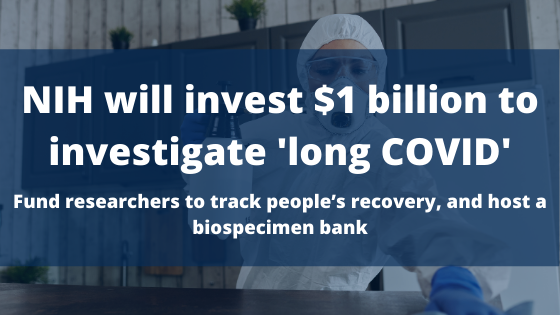The United States has announced that it will spend big on research into ‘long COVID’ — the long-lasting health effects of a SARS-CoV-2 infection. The National Institutes of Health will fund researchers to track people’s recovery and will host a biospecimen bank.
Symptoms of long COVID are wide-ranging and include fatigue, fevers, and shortness of breath, as well as neurological conditions such as anxiety and depression, and an inability to concentrate. They can appear weeks after a SARS-CoV-2 infection and linger for months. The NIH has begun referring to the collection of after-effects as post-acute sequelae of SARS-CoV-2 infection, or PASC.

One of the first projects the NIH has said it will fund is a recovery-tracking effort. Investigators will collaborate to record the recovery paths of at least 40,000 adults and children with SARS-CoV-2 in a ‘metacohort’, to observe who develops long-term effects and who doesn’t. The metacohort will cover people of all ages, including pregnant people, to help researchers pin down the range of effects that people experience while recovering from an infection.
A separate project will record the effects of COVID-19 on various organ systems by collecting evidence from autopsies. This type of analysis has so far indicated that the disease can destroy tissue in the lungs, as well as other organs — but researchers would like more detailed information. In another effort, the NIH will host a bank of biospecimens such as blood, urine, feces, and cerebrospinal fluid from people with PASC; researchers will be able to access the samples to inform future studies.
Click here to read more.
Read how OpenSpecimen is used by leading biobanks to manage COVID biospecimens.
